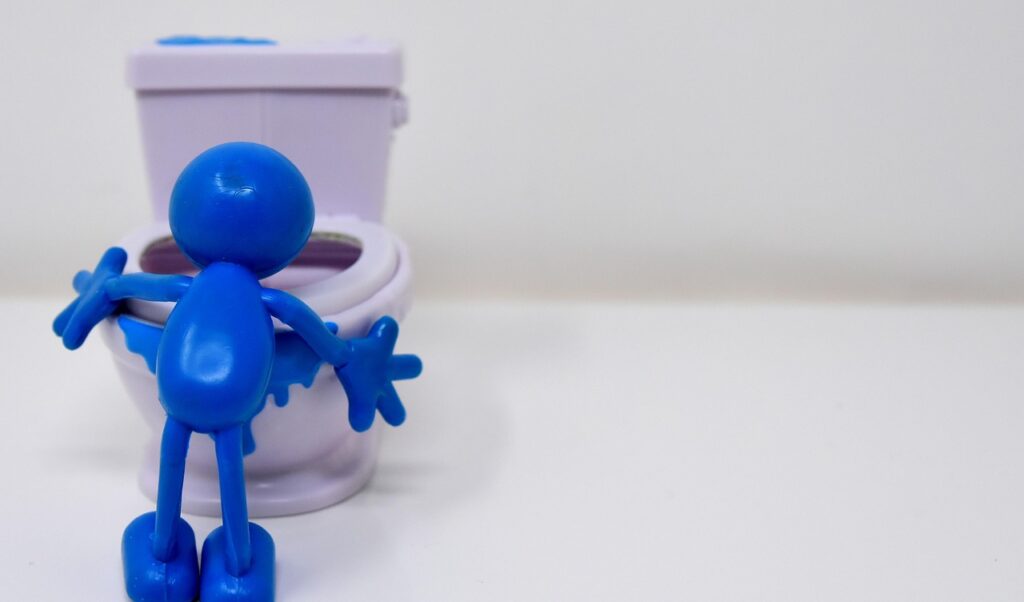
Emetophobia: Understanding and Treating the Fear of Vomiting
Trigger Warning: For those struggling with emetophobia, this may be uncomfortable to read
Emetophobia, the intense fear of vomiting affects more people than many realize. A study in European Psychiatry found while severe cases can affect approximately 0.1% of the population, milder cases of vomit phobia can affect between 3.1% to 8% of the population. Despite these numbers, emetophobia remains largely unrecognized compared to other anxiety disorders. As a therapist who has worked with clients battling this fear, I’ve witnessed firsthand how it can silently dominate someone’s daily existence.
If you find yourself constantly worried about throwing up or experiencing panic at the thought of vomiting or being around vomit, know that you’re not alone and recovery is possible.
Key Takeaways
-
- Emetophobia is a the fear of vomiting that goes beyond normal discomfort.
- Triggers include illness, certain foods and words related to vomit.
- Treatment options include CBT, EMDR, exposure therapy and sometimes medication. Left untreated, it can lead to chronic anxiety, avoidance and social isolation.
What is Emetophobia
Emetophobia is an intense fear of vomiting or throwing up. While most people find vomiting to be unpleasant, those with this phobia experience overwhelming anxiety about it, which is different from “normal” anxiety. To the point of experiencing panic attacks when triggered. At times it can be a cruel cycle of nausea triggering the fear, which makes the nausea worse, which escalates the fear of throwing up until panic ensues. This fear can take over their daily lives, leading to avoidance of certain foods, social situations and even travel.
How to Say Emetophobia
It’s a funny looking word and it sounds like eh-mee-tow-fow-bee-uh. Now you know and you can use this word without using the word vomit, which can be triggering to those with this fear.
What Makes Emetophobia Unique
Unlike other phobias that can be avoided, vomiting is unpredictable. You don’t know when you’ll vomit but you may know certain situations or things that could cause vomiting. In addition, there’s the anticipation of vomit. Which is being super vigilant of the potential of vomiting and can be more anxiety producing than actually throwing up. People with emetophobia often develop strict control strategies, like avoiding certain foods, over-sanitizing to avoid getting sick or steering clear of sick people. Many haven’t vomited in years but the fear hasn’t gone away. They tend to believe their careful habits have prevented it.
If you’re living with emetophobia, you may recognize these patterns as you try to control your exposure to throwing up. The constant vigilance is exhausting, isn’t it? But understanding these patterns is the first step toward breaking free from them.

Where Does Emetophobia Come From?
It often starts in childhood. Maybe you had a traumatic vomiting episode. Maybe you saw someone else get sick in a way that felt traumatic. Over time, your brain links vomit to danger. And when that happens, even a hint of nausea can trigger a panic attack.
Your brain thinks “This is NOT safe.” Your body responds with an increased heart rate, feelings of nausea and breaking into a cold sweat. This leads to feeling like you’re going to throw up and an emotional meltdown happens. This fear may feel like it’s protecting you but it’s actually keeping you trapped.
Why is the Fear of Vomiting So Common
Even though emetophobia is not widely discussed, it tends to be more common than people think, especially among women. It often starts in childhood after a traumatic vomiting episode, making the brain hypervigilant of anything that could trigger nausea. Sometimes it can be a modeled behavior from observing others’ reactions to vomit.
Symptoms, Signs and Causes
What are the Symptoms of Emetophobia
People with vomit phobia or the fear of throwing up may experience:
- Physical: nausea, stomach pain or fluttering, panic attacks.
- Behavioral: avoiding certain foods, avoiding sick people, avoiding certain places, hyper awareness of signs of illness in self and others.
Can Emetophobia Cause Nausea
Yes! Anxiety about vomiting can cause stomach issues, creating a cycle where fear of nausea makes nausea worse. Anxiety releases stress hormones that mess with digestion, triggering:
-
- A churning stomach
- Loss of appetite
- That awful “I might throw up” feeling
So you panic. Which makes the nausea worse. And the cycle repeats.
What Are the Signs of Emetophobia

Some key signs include:
-
- Avoiding people who are sick
- Avoiding places where sick people may be (i.e., hospitals, doctor offices, etc.)
- Being overly cautious about getting sick by cleaning, sanitizing, etc.
- Avoiding tv shows, movies where there could be a throwing up scene
- Avoiding words like vomit, puke, bark, upchuck, heave, etc.
There’s a lot of avoiding that people with emetophobia do.
What Causes the Fear of Vomiting
Emetophobia is mainly caused by having a negative experience involving vomiting, such as
-
- A traumatic past experience with vomiting
- Witnessing others vomit
- Having an anxiety disorder
- A strong need for control
But people with an anxiety disorder or a strong need for control can also develop vomit phobia.
What Triggers Emetophobia
Common triggers include:
-
- Seeing or hearing someone vomit
- Feeling nauseous
- Certain smells or foods
- Germs and sickness
- Hearing words related to vomit
How Debilitating Can a Fear of Vomiting Be
This fear can take over daily life. People with a more severe fear of throwing up may become isolated because they’re avoiding social events where vomiting may occur. Others may refuse to travel due to motion sickness which trigger feelings of nausea and dizziness. Sometimes, emetophobia may cause eating issues (not eating or drinking for fear of vomiting or avoiding certain foods) which can be misdiagnosed as an eating disorder.
Left untreated, the fear of throwing up increases overall anxiety levels, wreaking havoc on the nervous system and potentially causing other physical ailments.
Diagnosis and Tests
How is Emetophobia Diagnosed?
If you’re wondering whether what you’re experiencing is emetophobia, ask yourself:
-
- Does my fear of vomiting interfere with my daily activities?
- Do I spend significant time worrying about it?
- Have I changed my eating habits or social activities because of my fear of throwing up?
If you answered yes to these questions, speaking with a mental health professional could provide clarity and hope.
A mental health professional will assess for symptoms and behaviors that are signs for vomit phobia. Since it can often be misdiagnosed as an eating disorder or OCD, a thorough evaluation is crucial. Emetophobia often falls under the category of “Specific Phobia” in the DSM-5.
Are Emetophobia and OCD Linked
They share similarities and emetophobia can cause OCD symptoms like avoidance behaviors such as avoiding sick people, eating out, etc. It may even cause some compulsive checking behaviors like googling symptoms for food poisoning, knowing the incubation period of illnesses and monitoring stomach sensations. However, emetophobia lacks the ritualistic compulsions seen in OCD.
Therapy can help regardless of If your fear of throwing up feels obsessive.
Can Emetophobia Be Cured
How to Get Rid of Emetophobia
In Maryland and Nevada, therapy for emetophobia may include cognitive behavioral therapy (CBT) and exposure therapy to help reframe thoughts and gradually face fears. Sometimes using therapies that are helpful for Trauma, such as Eye Movement Desensitization and Reprocessing (EMDR) can also be helpful if vomit phobia originated from a traumatic vomiting experience.
Why Is Emetophobia Hard to Treat, or Is It
Many people believe their avoidance strategies keep them from vomiting, making it hard to let go of those behaviors. However, with the right approach, treatment can be highly effective. Because avoiding vomit works in the short term, you may believe you have everything under control. You don’t get exposed, so you don’t panic.
But the more you avoid it, the stronger the fear gets. Your brain never learns that vomit isn’t dangerous. So, treatment involves breaking that cycle.
Cognitive Behavioral Therapy (CBT) for Emetophobia
CBT helps individuals identify irrational thoughts about vomiting and replace them with healthier perspectives.
Notice anxious thoughts: “If I get sick, it’ll be the worst thing ever.”
Challenge them: “It’ll suck, but I’ll survive,” or “I’ve thrown up before and I survived.”

Exposure Therapy for the Fear of Vomiting
Gradual exposure to vomit related fears. Starting with words or images, then progressing to real life scenarios helps reduce anxiety.
-
- Start small, say the word vomit out loud.
- Watch a cartoon where someone throws up.
- Work your way up to real-life scenarios.
What Medications Treat Emetophobia
While no medication specifically targets emetophobia, anti-anxiety medications or antidepressants may help manage symptoms.
How Soon After Treatment Will I Feel Better
In my clinical work, improvement varies, but many people feel relief within a few months of therapy with consistent effort.
Living With Emetophobia
Finding Support: Communities for People with Emetophobia
You’re not alone in your fear of throwing up. Connecting with other who understand what you’re going through can be very validating and provide practical coping skills.
- On Line Support Groups: There are Facebooks groups for people with fear of throwing up as well as for parents who may have a child with vomit phobia. Reddit has an forum that can offer guidance and support.
- Webinars: The Anxiety& Depression Association of America offers webinars and conferences that discuss the topic and treatment for emetophobia.
While peer support is helpful, it works best with professional treatment with a mental health professional rather than as a replacement. In my therapy practice, I’ve helped clients who struggled with emetophobia. They’re now living and loving life without the fear of vomiting. If you’re interested in how I can help you, please reach out to me here.
Which Celebrities Have Emetophobia
Denise Richards mentioned in her book, The Real Girl Next Door, that she has emetophobia. Charlie Booker also wrote in his article “There’s a plague stalking the land and I’m terrified. But here’s how to avoid Norovirus meltdown … “ of his fear of vomiting. And in the article about Joan Baez, “The Life and Times of a Secret Badass” by David Browne, Baez admitted she had multiple phobias, one of them being the fear of throwing up.
FAQ
Emetophobia is an intense fear of vomiting — either vomiting yourself, seeing someone else vomit, or being in situations where vomiting might occur. While many people dislike vomiting, emetophobia causes overwhelming anxiety that interferes with daily life.
Emetophobia often starts after a traumatic vomiting experience or witnessing someone else get sick. It can also develop in people with anxiety disorders or a strong need for control. Over time, the brain begins to associate nausea or illness with danger.
Symptoms can include nausea, panic attacks, avoidance of certain foods, fear of sick people, obsessive checking for signs of illness, and avoiding situations like restaurants, travel, or social events.
Yes. Anxiety can cause physical symptoms—like nausea and stomach discomfort—that mimic the feeling of being sick, which can then trigger the fear of vomiting. This creates a cycle that reinforces the phobia.
They are different, but they can overlap. People with emetophobia may develop OCD-like behaviors such as excessive sanitizing, googling symptoms, or checking for illness. However, emetophobia does not usually include ritualistic compulsions typical of OCD.
Evidence-based treatments include Cognitive Behavioral Therapy (CBT), Exposure Therapy, EMDR for trauma-related origins, and sometimes medication for anxiety. Many people see significant improvements within months.
Many people recover fully or experience major symptom reduction. With therapy, the brain learns that vomiting is uncomfortable but not dangerous, breaking the fear-avoidance cycle.
Yes. Some people avoid foods, textures, or eating altogether because they fear getting sick. This can be mistaken for an eating disorder, making an accurate diagnosis important.
Offer gentle reassurance, avoid minimizing their fear, and encourage professional help. Supportive behaviors, like respecting triggers, can make a big difference, but therapy is often needed to break the cycle long-term.

Judy Wang, LCPC, CPC
Judy Wang is a Licensed Clinical Professional Counselor in Maryland, Nevada, South Carolina, and Vermont. She is EMDR Certified and trained in Exposure and Response Prevention (ERP) for Obsessive-Compulsive Disorder. With over a decade of experience, Judy specializes in helping individuals navigate anxiety, trauma, OCD, and people-pleasing patterns. She provides personalized care for teens and adults seeking deep, long-term healing and emotional wellbeing.
